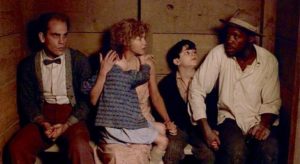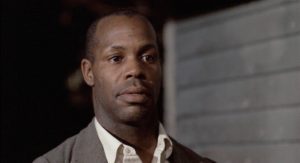Places in the Heart (1984). Written and directed by Robert Benton (Academy Award for Best Original Screenplay). Starring Sally Field (Academy Award for Best Actress). John Malkovich, and Danny Glover. PG, 111 min.
She’s suddenly a widow with two suddenly fatherless young children, and it is the depths of the Great Depression in rural Texas. And the bank, with a big mortgage on her place, wants her to sell both house and land to it and send her kids to live with relatives. What is a newly single mother to do, both personally and practically? Being Edna Spaulding (Sally Field, in a Best Actress performance), though, she will have none of it. Period. That is the premise and question at the heart of Places in the Heart, a film by Oscar-winning writer and director Robert Benton. And what follows is for the most part pure melodrama, save some very quiet but nonetheless prominent elements of the story.
Still, easier said than done, for sure. Quite out of nowhere, a homeless and out-of-work African American who begs a meal randomly suggests that she could plant cotton on her sizeable chunk of uncultivated land and thereby make a tidy profit. And lo, later the same day, she decides to do it, and in the same breath hires the fellow, Moses (Danny Glover), to lead the way (he has said he knows everything there is to know about farming cotton). And so it is that Moze gets to work, lives in the barn, and befriends the children.
And then comes a fellow far more problematic, shoved off on Ms. Spaulding by the oozy banker who proposed she sell the place to the bank and send her kids away. His brother-in-law Will (John Malkovich), blinded in the First World War, has come to live with the banker, and since Will is an ornery sort, the banker is most eager to get rid of him, telling Edna that the bank would look favorably upon her efforts in self-support. As for Will, he doesn’t like the idea either and wants nothing but to be left alone caning chairs (his trade) and listening to music on his prized phonograph.
Just what is happening here comes clear amid the approach of a violent thunderstorm/ torn

ado when all must take refuge in the backyard storm cellar, a sequence that Benton carefully choreographs in the hope that the viewers will pay very close attention. Briefly put, amid this emergency everybody reaches out, quite literally, for one another. Blind though he be, Will finds his way to the attic where Edna’s little girl, Possum, is playing. He grabs her and she leads the two of them to the backyard where Edna amid the blinding dust leads them both to the shelter. Moze does the same with Frank, who has run home from school to help his family. Just as Moze is about close the shelter door, he sees in the dark and dust a shadowy figure, who he promptly goes out to fetch, and Edna will also lead that pair to the shelter.
The five sit together in the cellar as the storm rages above, not knowing if there will be anything left when the storm abates. In a long sequence, ostensibly not exciting at all, Benton’s camera looks closely at each individual face and then pulls back for a long stare at the silent, motionless group.

Here is, in fact, the culmination of the storm, literal and metaphoric, “the pitiless storm,” as Frederick Buechner calls it, which is the travail of what terrible things life can do to people. And this group, battered and broken, has known more than the usual share. The shot summarizes and lingers, as it foreshadows the story’s destination. To be sure, these random, hard-pressed people have come together out of practical necessity. Still, for those who wear their biblical goggles to the movie theater, the group, strangely, looks vaguely familiar, as a full-on representation of the kind of kingdom Jesus talked about over and over: widows, orphans, blind, and exiled, clinging together for a dearer life (Buechner, again). And it is a tableau suitable for framing and hanging on the living room wall and even in a church entryway.
And that is just the first half of the film, and the close of storm sequence foreshadows one of the most remarkable endings in all of cinema. And that, for sure, is an icon worth hanging on walls everywhere and, yes, in the deep places of the heart. See Reconciliation.
written by Roy Anker
Sign Up for Our Newsletter!
Insights on preaching and sermon ideas, straight to your inbox. Delivered Weekly!

Categorized into Kingdom
Places in the Heart (1984) – 2